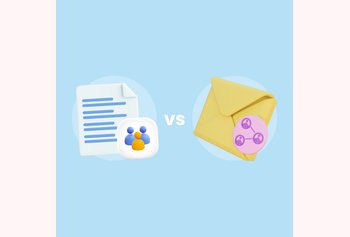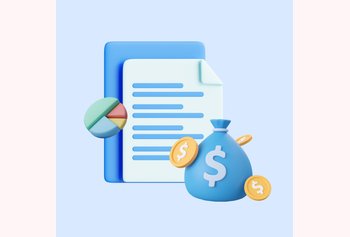Top 10 Customer Tracking Software in 2024
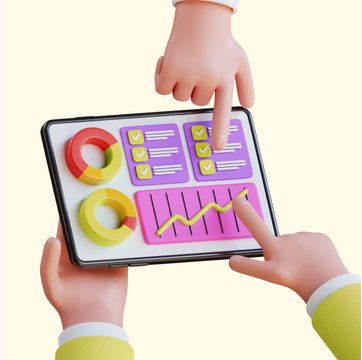
Table of contents
The business landscape of 2024 is more customer-centric than ever before. In this environment, understanding and managing customer interactions isn’t just a nice-to-have; it’s vital for success.
Here, customer tracking software emerges as a crucial tool for businesses aiming to thrive. These tools are not just about collecting data; they are about crafting experiences tailored to individual needs and preferences.
Consider this: McKinsey analysis shows that companies that are leaders in customer experience (CX) achieved more than double the revenue growth of “CX laggards” between 2016 and 2021. The revenues of CX leaders also rebounded from the pandemic more quickly than those of other companies.
By harnessing the power of customer tracking tools, businesses can transition from a traditional, one-size-fits-all approach to dynamic, data-driven strategies. This shift is about being a step ahead in understanding what customers desire.
As we delve into the world of customer tracking software, it’s crucial to understand what these tools are, their capabilities, and how they can be a game-changer for businesses looking to transform their customer engagement strategy.
Let’s explore the essence of these tools and unveil the top options in the market today.
Table of Contents
- What is Customer Tracking Software?
- Top 10 Customer Tracking Software for Your Business in 2024
- How to choose the best customer tracking software in 2024?
What is Customer Tracking Software?
Customer tracking software, at its core, is a blend of analytics, customer relationship management, and data collection tools. It allows businesses to track, record, and analyze customer behavior and interactions across various channels, including websites, social media, email, and phone.
Let’s take a look at the features of a customer tracking software:
1. Data Collection and Management: This is the foundation. The software collects data from multiple touchpoints throughout the customer journey, creating a comprehensive view of each customer’s interactions with your business.
2. Customer Behavior Analysis: By leveraging AI and machine learning, the software identifies patterns in customer behavior. This insight is crucial for understanding preferences and predicting future actions.
3. Personalization: Utilizing the collected data, the software enables businesses to tailor experiences, offers, and communication to individual customer needs, enhancing engagement and loyalty.
4. Integration Capabilities: Effective customer tracking software seamlessly integrates with other business tools like CRM systems, email marketing platforms, and social media channels, ensuring a unified approach to customer data.
5. Real-Time Reporting and Analytics: The ability to generate real-time reports and analytics is crucial. It empowers businesses with actionable insights, enabling swift decision-making and strategy adjustments.
6. Customer Feedback and Survey Management: Gathering and analyzing customer feedback is essential for continuous improvement. This feature helps in understanding customer satisfaction and areas of improvement.
7. Automation of Routine Tasks: Automation features help in reducing manual workload, enabling teams to focus on more strategic tasks.
8. Security and Compliance: With the growing importance of data privacy, the software must ensure the security of customer data and comply with relevant regulations like GDPR.
Top 10 Customer Tracking Software for Your Business in 2024
Delving into the world of customer tracking software, each platform offers a unique blend of features catering to diverse business needs. Let’s explore these solutions in more detail.
1. Hiver
First on the list is Hiver. It transforms Gmail into a powerful customer service platform, ideal for businesses familiar with and reliant on Google’s ecosystem.
It comes with an intuitive interface, and other important features that allow for effective customer communication management and tracking.
Here is a comprehensive overview of Hiver’s key customer tracking features:
1. Data Management: Hiver integrates directly with Gmail, allowing it to manage customer emails and interactions within a familiar interface. This integration ensures all customer communications are centralized, making data management more streamlined and efficient.
2. Personalization: Hiver enables personalization by allowing users to categorize and tag communication. This feature helps in organizing customer interactions and ensures that responses are tailored to each customer’s specific query or issue.
3. Integration Capabilities: While primarily designed to work within Gmail, Hiver can integrate with other tools like Asana, Jira, and Slack, to extend its functionality. This integration capacity ensures a more cohesive approach to customer data management.
4. Real-Time Reporting and Analytics: Hiver provides reports on team performance and metrics that matter to your business. These insights are essential for monitoring customer engagement and evaluating the efficiency of customer service efforts.
5. Customer Feedback and Survey Management: CSAT surveys can be collected and managed through its system, particularly when coupled with additional integrations.
6. Automation of Routine Tasks: Hiver allows the automation of certain email-related tasks, such as tagging and categorizing incoming emails. This feature increases operational efficiency by reducing the manual workload.
7. Security and Compliance: As an extension of Gmail, Hiver benefits from Gmail’s robust security measures. This ensures that customer data is handled securely, maintaining privacy and compliance with regulations like GDPR.
Pricing:
Hiver offers a free plan that helps you manage customer support at zero cost. The paid plans start at :
- Lite plan: $19/per user/per month
- Pro plan: $49/per user/per month
- Elite plan: $79/per user/per month
2. Zendesk
Zendesk offers a robust, feature-rich platform for managing customer interactions across multiple touchpoints. It’s a preferred choice for enterprise businesses looking for a scalable and comprehensive customer support solution.
Zendesk provides detailed customer interaction histories, customizable support workflows, and advanced analytics for tracking customer satisfaction and agent performance. Its AI-powered automation streamlines responses and supports ticket management, enhancing overall efficiency.
Zendesk’s AI automation functions by leveraging advanced AI and machine learning technologies to enhance customer service experiences. It employs tools like sentiment analysis, topic classification, and urgency detection to automatically tag and route incoming tickets, streamlining the support process.
Limitations:
- Some users find the interface complex and not very intuitive.
- Customization and advanced feature setup may require technical expertise.
- Zendesk charges anywhere between $1500 to $2800 for personalized training.
- Pricing can be prohibitive for smaller businesses or startups.
- Integration with third-party tools, though extensive, can be challenging to set up.
Pricing:
Zendesk has three tiers of pricing for small to large-sized businesses:
- Suite Team: $49 per agent per month
- Suite Growth: $79 per agent per month
- Suite Professional: $99 per agent per month
For enterprise companies, Zendesk has two tiers of pricing:
- Suite Enterprise: $150 per agent per month
- Additional and more powerful enterprise plans start at $215 per agent per month
(Additional charges, ranging from $1500-$2800 for platform training)
Free Trial: 14 days
Explore the best alternatives to Zendesk.
3. EngageBay
EngageBay is a versatile, all-in-one CRM platform tailored for small to medium-sized businesses. It combines ease of use with a comprehensive feature set, making it an ideal choice for streamlined customer management.

EngageBay excels with a unified contact management system, sophisticated task and deal management, and efficient appointment scheduling. Its marketing automation allows for targeted customer interaction, while the landing page and form builders enhance lead generation. The platform’s Service Bay offers tools like live chat, ticket management, and service automation for responsive customer support.
Limitations:
- Limited customization in email templates and forms.
- Advanced analytics and reporting features could be improved.
- Requires time to master the platform and use it to its full potential.
- Third-party integration could be more seamless, as reported by the users.
Pricing:
- Free: Limited features
- Basic: $12.74/agent/month
- Growth: $55.24/agent/month
- Pro: $101.99/agent/month
4. Freshdesk
Freshdesk is a cloud-based customer support platform that offers multi-channel support, including email, chat, and social media, to manage customer interactions efficiently. It’s highly regarded for its ability to cater to businesses of all sizes, from small startups to large enterprises.
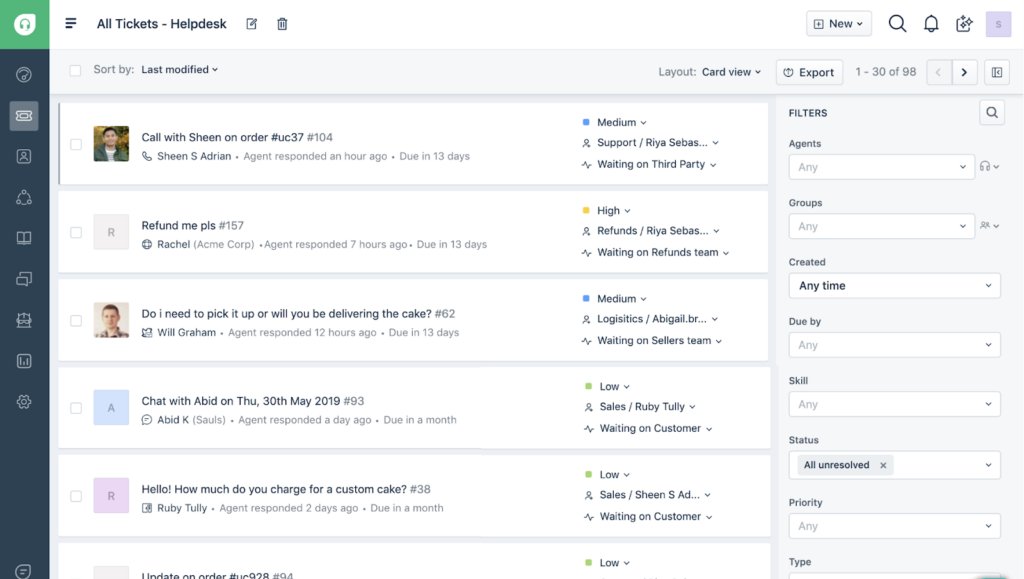
Freshdesk is equipped with several advanced features to streamline customer support. Key functionalities include custom ticket fields for organizing and prioritizing tickets, support time tracking to monitor and log time spent on each support issue, and canned responses for quick and efficient customer interactions.
The platform includes extensive analytics and reporting tools for a thorough understanding of customer satisfaction. Additionally, Freshdesk provides a mobile app for managing customer service activities on the go and field service management tools for businesses with field operations.
Limitations:
- Some customization options, particularly in features like ticket fields, might be limited.
- The platform requires a significant setup time, particularly for configuring categories and support options.
- Integration between different Freshworks products, like Freshdesk and Freshchat, could be more seamless.
- Customer support from Freshdesk occasionally may not communicate crucial software updates effectively, potentially disrupting service delivery.
Pricing:
Freshdesk’s Support System offers four options:
- Free: Limited features
- Growth: $15 per agent per month
- Pro: $49 per agent per month
- Enterprise: $69 per agent per month
Freshdesk’s Omnichannel system offers three options:
- Omnichannel Growth: $29 per agent per month billed annually
- Omnichannel – Pro: $59 per agent per month billed annually
- Omnichannel – Enterprise: $99 per user per month billed annually
Free Trial: 21 days
Check out the best Freshdesk alternatives in 2024.
5. Tenfold
Tenfold is a comprehensive customer experience and communication management platform, particularly favored for its robust integration capabilities. It’s designed to enhance the effectiveness of sales and service teams by seamlessly connecting and tracking customer data across various systems.
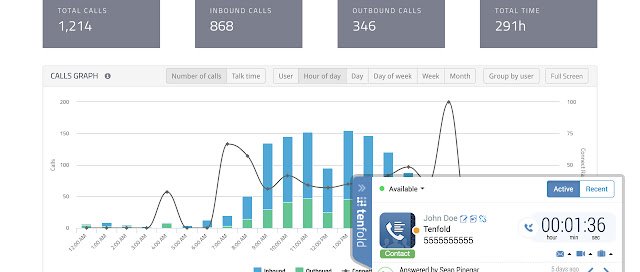
Tenfold stands out with its ability to integrate customer data and communication workflows, providing real-time customer context to sales and service representatives. It offers extensive CRM and sales dashboards, detailed sales reporting, and efficient document management. The software also features email integration and marketing analytics, enhancing the ability to track and engage with customers effectively.
Limitations:
- The software’s broad scope may require a learning curve for new users to fully utilize its capabilities.
- Certain functionalities, like direct dialing and incoming call tracking, might need further refinement.
- Some users have reported occasional difficulties with customer support responsiveness.
- There may be challenges in categorizing and excluding double dials from analytics, potentially affecting data accuracy.
Pricing:
Tenfold offers three pricing tiers: Essentials, Advanced, and Custom. You need to contact their team to get the pricing for each.
6. Kayako
Kayako is a versatile help desk and customer service software designed to manage customer inquiries efficiently across multiple channels. It is known for its customer journey tracking capabilities and caters to a wide range of business sizes.
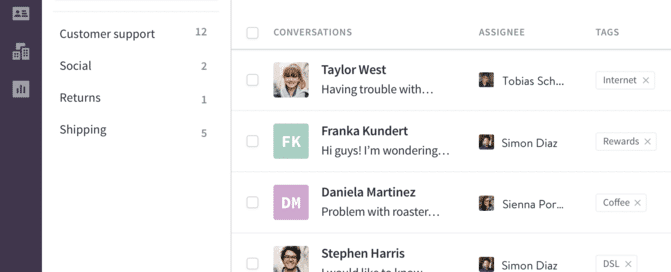
Kayako’s strength lies in its multi-channel support, allowing management and tracking of customer inquiries from email, live chat, social media, and web forms in a unified dashboard. Its ticketing system efficiently tracks and manages customer support tickets, and the knowledge base feature empowers customers to find answers independently.
Its live chat feature provides real-time support while automation and workflows streamline repetitive tasks. Kayako also offers robust reporting and analytics to gauge support team performance and customer satisfaction.
Limitations
- Users have reported occasional errors in the system, such as missing response recordings.
- The reporting features are somewhat limited compared to other platforms.
- Some users experience long loading times for tickets.
- The system might not be as intuitive for new users, requiring a steep learning curve to master its functionalities.
Pricing
Kayako offers two plans, Kayako Cloud and Classic On-Prem; however, you need to reach out to their team to know about the pricing.
Discover the best alternatives to Kayako.
7. HubSpot
HubSpot, renowned for its comprehensive CRM platform, offers a robust suite of tools designed to streamline and optimize customer tracking and engagement. The platform is particularly notable for its user-friendly interface and extensive features that cater to businesses of all sizes.
HubSpot’s CRM platform includes personalized email sequences, allowing for tailored communication with prospects and customers. The platform’s forms and meeting scheduling features streamline lead generation and appointment setting.
Limitations
- HubSpot’s advanced features, particularly in the Enterprise plan, can be quite expensive, potentially limiting access for smaller businesses.
- The platform may require significant time investment to fully leverage its wide range of features and capabilities.
- Some users may find the customization options in certain areas, such as reporting, to be limited compared to other platforms.
- There may be a learning curve associated with adopting and integrating the new AI-powered features into existing workflows.
Pricing
Hubspot’s CRM suite offers two plans:
- Professional: $1600/month (up to 5 users)
- Enterprise: $5000/month (up to 10 users)
8. Salesforce Sales Cloud
Salesforce Sales Cloud is a highly robust and scalable customer relationship management (CRM) platform. It is widely recognized for its comprehensive suite of features that cater to various aspects of customer tracking and engagement, making it a favorite among businesses of all sizes.
Salesforce Sales Cloud stands out for its deep customer insights and extensive CRM capabilities. It offers detailed customer profiles, activity tracking, and personalized customer journey mapping. The platform is also known for its advanced analytics, lead and opportunity tracking, and customizable dashboards, enabling businesses to have a 360-degree view of their customer interactions. Its automation features streamline sales processes and also offers integrations with numerous third-party applications to enhance its functionality.
Limitations
- The platform can be overwhelming for new users due to its extensive feature set.
- Customization and advanced setup may require technical expertise or additional resources.
- The cost can be on the higher side, particularly for small businesses or startups.
- Some users report a need for more intuitive navigation and user experience improvements.
Pricing
- Essentials: $25/user/month
- Professional: $75/user/month
- Enterprise: $150/user/month
- Unlimited: $300/user/month
- Free Trial: 30 days
9. Zoho CRM
Zoho CRM is a popular cloud-based customer relationship management software, known for its affordability and extensive range of features. It is especially beneficial for small to medium-sized businesses, offering a user-friendly interface and diverse functionalities to enhance sales, marketing, and customer service operations.
Zoho CRM provides an array of tools to improve customer tracking and engagement. Key features include email integration and automation, which allow for efficient communication and follow-ups. The software also excels in executing email campaigns with capabilities like customer segmentation and analytics for measuring campaign effectiveness. Project management features, like custom profiles and task timers, are included to align sales with broader team goals, and team collaboration tools improve internal communication.
Limitations
- The user interface may appear outdated and could benefit from more customization options.
- Users may find it time-consuming to migrate data from their existing CRM to Zoho.
- There have been reports of occasional bugs, especially in some integrations.
- The free version has limited functionalities and some users have found difficulty in obtaining phone support.
Pricing
- Standard: $14/user/month
- Professional: $23/user/month
- Enterprise: $40/user/month
- Ultimate: $52/user/month
- Free Trial: 15 days
10. Gladly
Gladly is a modern customer service platform that focuses on creating people-centered experiences. It’s designed for B2C companies and helps them maximize customer lifetime value – offering an all-in-one solution for agents to track customer interactions across various channels from a single interface.
Gladly stands out with its omnichannel capabilities, centralizing voice, email, chat, SMS, and social media customer communication. This allows customer tracking via various channels. The platform also allows agents to view a customer’s entire history—enabling contextual interactions.
Its real-time reporting and analytics allow businesses to monitor customer service performance effectively. Task management and customizable workflows within Gladly facilitate efficient customer issue resolution.
Limitations:
- The cost might be a significant consideration for small businesses or startups.
- There is an initial learning curve for teams to adapt to its extensive feature set.
- Some users have reported occasional issues with the software refreshing unexpectedly during use.
Pricing:
- Hero: $180/user/month
- Superhero: $210/user/month
- Free Trial: 14 days
How to choose the best customer tracking software in 2024?
With so many options, it can be overwhelming to choose the right customer tracking software. Each software we’ve explored offers a unique blend of features catering to different business needs and sizes. Whether you require advanced analytics, seamless integrations, or robust automation, there’s a solution out there that aligns with your business objectives.
Among these top contenders, Hiver stands out for its seamless integration with Gmail, making it an intuitive choice for businesses already familiar with the Google ecosystem. Its user-friendly interface, combined with powerful features such as automated workflows and real-time reporting, makes it a strong candidate for enhancing your customer tracking capabilities.
If you’re looking to transform your customer tracking experience, consider trying Hiver free for 7 days and see the difference it can make in your customer relationship management.












